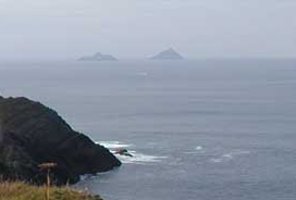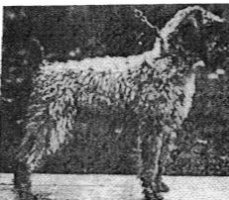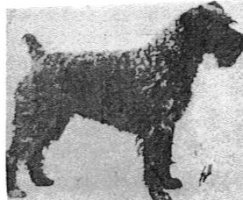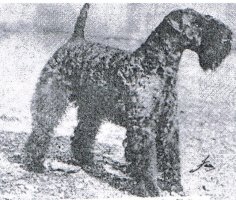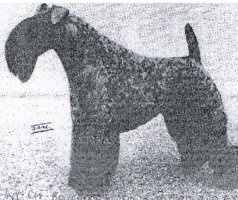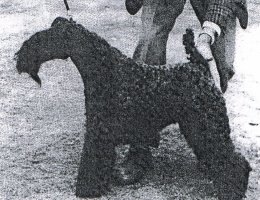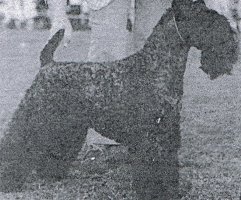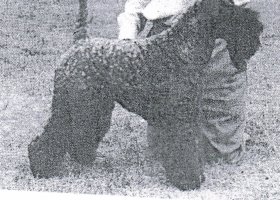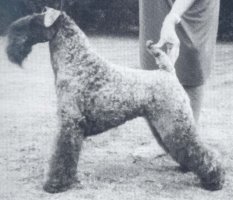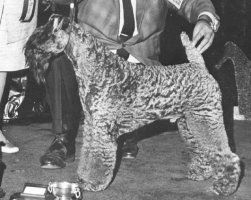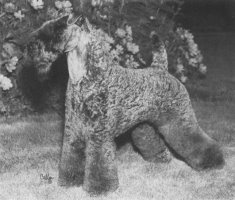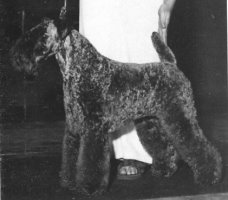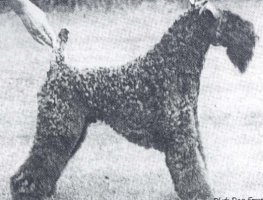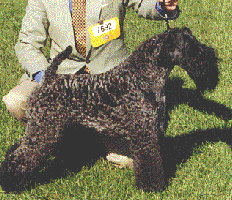
|
The History of the Breed (Reproduced with the kind permission from "Dog World") The Kerry Blue was the Irish farmers' dog. An all round farm dog, the Kerry was a cattle and sheep herder; excellent ratter; and courageous guard. Used as a gundog in Ireland where they also herded cattle and guarded stock, controlled rats, otters, badgers, fox & all vermin. There are reports that the Kerry has been used in Ireland to replace a spaniel, setter or retriever and on occasions all three! Whilst there are limited references to the breed before the twentieth century it is thought that Kerries existed in Ireland for a significant period of time before this. In 1887 silver haired Irish Terriers were exhibited at a show in Limerick. There are a number of myths and legends about the origins of the breed. The popular one being that the Kerry’s ancestor was Spanish and in the late 18th century swam ashore from a shipwreck at Tralee Bay and mated with local terriers to produce a terrier type dog with a dark blue coat. There are other suggestions that the Kerry has both Wolfhound and Bedlington in its blood. There has also been mention of Irish Terriers and Dandie Dinmonts. So we know that a Kerry type was being exhibited in Ireland as far back as the late 18th century. Without UK K.C. permission the 1st show was held in Dublin in October 1920 with County Kerry judges Daniel J. Nolan and Con O’Herlihy officiating. Of much interest is that Daniel Nolan was a member of the Republican Army and was wanted at the time by the British authorities! Of even more interest was that surprisingly ‘blind eyes’ were turned as exhibiting on the day were, amongst the club members others such as General Michael Collins, Dr Oliver St. John Gogarty and Sir James MacMahon the Under-Secretary for Ireland and several others, but also an inspector from the Royal Irish Constabulary! During the 1920’s there was discord over the name of the breed and the reason the name Kerry Blue Terrier remains is because the English KC continued to use it even though, particularly in Ireland, they sometimes refer to the breed as “the Blue”. E.M. Webb wrote in “Irish Monthly” the following about the breed: “His disposition is nigh faultless, if a slight tendency to diminish the cat population is accepted. He is intelligent, good tempered, affectionate, faithful and courageous (it is said that the Blue alone, of all dogs, will tackle an otter, single-handed in deep water), unrivalled as a ratter; charming as a companion, trustworthy as a watchdog. It has been said ‘the Kerry Blue has sometimes suffered from a reputation for surliness, his reputation as a show dog has grown among fanciers in England and the United States, and most owners (unless they own cats) would agree with Webb’s assessment of the breed as ‘well nigh perfect’. “ It wasn’t however until 1921 that the Dublin Irish Blue Terrier Club held its first breed show. It was in the early days of exhibiting Kerries in Ireland that a Kerry had to face and draw a badger before it could become a champion.
The breed was established as Ireland’s National Terrier in 1927 and along with Henry B Fottrell several prominent founder members of the Dublin Irish Blue Terrier Club arranged a meeting in 1922 in order to form the Irish Kennel Club. Henry Fottrell was the owner of the first Irish Ch, Rog Tailteann, also registering the first Irish dog, Fuamnach, (of any breed) with the Irish KC. The Kennel Club recognised the Kerry Blue in 1922 and they were scheduled for the first time at Crufts that year. The same year saw the formation of the Kerry Blue Terrier Club of England. There are records to indicate that a small number of Kerries were being shown in American and Sweden at this time. The first English Champion was Ch Festive Bells, bred by Mrs Brennan in 1922. The first English and Irish Champion was Castleton Rose and the breeds CC record holder is Ch Princeton Hell of a Fellow who was born in 1931 and won 42 CCs.
The Kerry Blue Terrier Association and the Northern Kerry Blue Terrier Club was established in 1947 and both celebrated jubilee anniversary years in 2007 with what must have come near to present day record entries. There are some Kerries and Kennels that should be mentioned at this stage as they have impacted on the breed as we know it today. The Granemore Kerries owned by the late Malachy McGeown and his wife Bridget is home to 50 champions. The great producing bitch Ch Granemore Valencia, who won 7 CCs and produced 8 champion children together with Ch Arkama Made to Measure, must rank amongst 2 of the top producing bitches. During the 1970s and 1980s there were a number of Group winning dogs emerging from Binate, Granemore, Arkama, Louisburgh and Torums kennels. These included Ch Binate Plantagenet who was RBIS at Crufts in 1977, Ch Arkama Take By Storm, Crufts Group winner, and Ch Louisburgh Tango of Granemore who was Top Kerry in 1989, a multiple Group winner and RBIS at 2 championship shows. There have also been a number of successful imported Kerries over the years. They include Ch Music’s Sonata (Top Kerry 1976), Ch, American & Canadian Ch Callaghan of Leander (winner of 19 CC’s, multiple Championship Show Group and BIS winner including BIS at Crufts 1979). Ch Bluefires Double Trouble of Fermoy another Group winner sired a number of Granemore and Torums champions.
Two great American dogs that must be mentioned are the famous American Ch Melbee’s Chances Are handled by Ric Chashoudian who captured the then record for All Breed BIS wins for the breed and produced some 66 champions. Another great winning dog was Ch Kerrageen’s Hotspur handled by Bill McFadden. He produced a litter of 5 for Arkama all of whom became champions and contributed to the 7 generation bitch champion line for this kennel to date. Ch Fermoy Knight O Terra was Top Kerry in 1990 winning 3 BIS at championship shows before going on to be an American and Australian Champion for his owner David Roche. American Ch Tantara’s Whiskey Jack was another Group and BIS winner and was Top Terrier in 1992 handled by Geoff Corish. More recently Int Ch Balboa Belmondo was handled by Don Munro to become a Group and BIS winning dog, shortly followed by Group and BIS winning World, It, Int, GB Ch Balboa El Cid also handled by Don, another UK Group and BIS winner.
In the late 1990s the dog world was dominated by the outstanding Ch American Ch Torum’s Scarf Michael owned by Carol and Ron Ramsay and campaigned by Geoff Corish and Michael Coad. Not only a multiple Group and BIS winner in the UK, including the ultimate of BIS at Crufts in 2000 but also a top winning, record holding dog in the USA handled by Bill McFadden. Then along came Phil Davis’ Group and RBIS winning Ch Perrisblu Royal Fern who was Top terrier in 2001 and Ch Torum's Tunde Bayou (same way bred as Scarf Michael), a multiple Group and BIS winner and RBIS at Crufts in 2003.
More recently there have been some other noteworthy Group & BIS winning dogs campaigned in the UK. These include the Bournemouth BIS Ch/Ir Ch Lunabrook Hot Shot, the Welsh KC Group winning Ch/Ir Ch Cranmoss Finbar of Colinca (also a winner of several groups in Ireland) owned by the Nagle family, and last year the UK’s show ring was dominated by the UK’s Top Kerry 2007 Cara Davani’s homebred Ch Arkama Penelope Pitstop who won 6 CCs, Group 2 & 3 and Int, Czech, Polish, Slovakian, Ir & GB Ch Edbrios Blue Ivanhoe, owned by Jarka Poulova and Eddie and Philip O Brien who was Top Dog all Breeds in Ireland in 2007 and also a Group and RBIS winner in the UK, albeit lightly shown over here. Cara Davani (Kebulak)
***
|
|
|||||||||||||||||||||||||||||||
